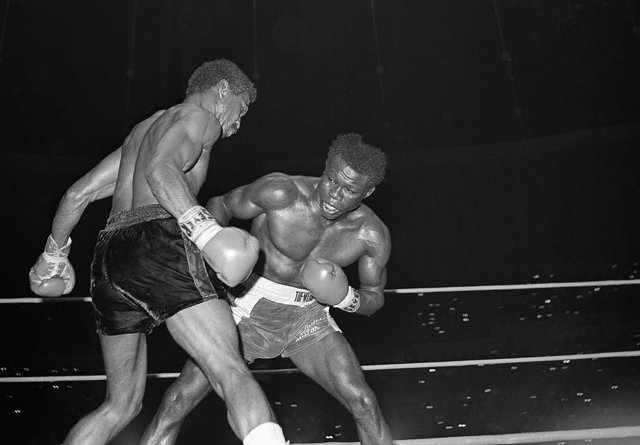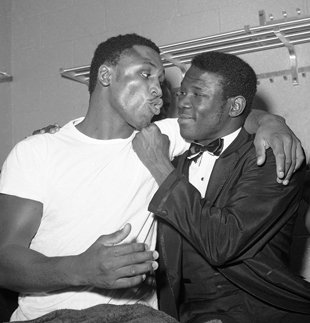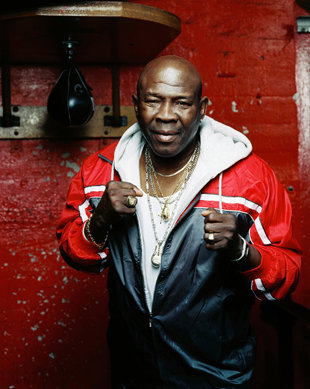R.I.P. – Emile Griffith
Emile Griffith, noted ex-welterweight and middleweight champion, dies at 75
By Kevin Iole | Boxing – 14 minutes ago
Emile Griffith (R) lands a right to Jose Napoles during a 1969 title fight in Los Angeles (AP file photo)Emile Griffith was one of the toughest guys in one of the toughest sports on Earth, a kind man who wasn’t so kind in the ring. He was one of the best fighters in an era loaded with elite fighters and, despite his induction into the International Boxing Hall of Fame in 1990, was never given the credit he was due.
Rather, Griffith, who died Tuesday in New York at 75, will sadly best be remembered for killing rival Benny Paret in the ring during a nationally televised welterweight title fight at Madison Square Garden in New York.
Griffith and Paret had split their first two bouts, when they met on March 24, 1962 in a rubber match for Paret’s belt. Before the fight, Paret taunted Griffith, using a Spanish word that is slang for homosexual. That apparently enraged Griffith.
In his Sports Illustrated account of the fight, Gilbert Rogin wrote:
As before, Paret called Griffith ‘maricon,’ gutter Spanish for homosexual. It is the most vulgar epithet in that violent idiom and is particularly galling to Griffith, who has a piping voice, wears extravagantly tight clothes, has designed women’s hats and is, ordinarily, a charming, affectionate kid. Griffith told Benny to “shut up.” Paret laid a gratuitous, slighting hand on Emile’s back. “Keep your hands off me, Paret,” snarled Griffith.
The fires Paret had lit in Griffith were banked as he entered the ring Saturday night, but they were not banked very deep.
In 2005, when a documentary on his life, “Ring of Fire,” appeared on USA Network, Griffith discussed his sexual orientation with New York Times columnist Bob Herbert.
Herbert, who said he’d watched Griffith-Paret III on ABC as a child in 1962, wrote:
I asked Mr. Griffith if he was gay, and he told me no. But he looked as if he wanted to say more. He told me he had struggled his entire life with his sexuality, and agonized over what he could say about it. He said he knew it was impossible in the early 1960’s for an athlete in an ultramacho sport like boxing to say, “Oh, yeah, I’m gay.”
But after all these years, he wanted to tell the truth. He’d had relations, he said, with men and women. He no longer wanted to hide. He hoped to ride this year in New York’s Gay Pride Parade.
Former heavyweight champion Joe Frazier (L) and Griffith in the locker room at Madison Square Garden in 1968 (AP…Griffith, who was viciously attacked by a gang of men after leaving a gay bar in New York in 1992, suffered from dementia. In a gripping 2005 piece by Gary Smith in Sports Illustrated, Griffith talks about the difficulty he had overcoming Paret’s death and about his dementia.
It was a sad and sobering story of a once strong, proud man.
Get used to the smoke. Let it fill your lungs and sting your eyes. There’s no getting rid of it, not in a story about Emile Griffith, not in the one American arena where the smoke just doesn’t seem to dissipate. A policeman or a judge or a lawyer can openly be something other than heterosexual. A doctor or teacher or carpenter can be, along with, of course, an actor or a musician or a writer. Even executives on Wall Street now can. But a male athlete in a major sport?
The world, thankfully, is changing, and boxer Orlando Cruz announced shortly before a fight that he is gay. In October in Las Vegas, he’ll fight Orlando Salido for a vacant title. Also, earlier this year, NBA player Jason Collins publicly announced he’s gay.
Griffith, though, lived in a time where his sexuality would not be accepted.
But he was one of the best boxers of his time, winning welterweight and middleweight titles while compiling a record of 85-24-2, with 23 knockouts and one no contest.
He scored a number of quality wins, beating the likes of Nino Benvenuti, Dick Tiger, Bennie Briscoe, Ralph Dupas and Paret, among others.
…………………………………………………. Emile Griffith in 2005 (AP)
But, as Dan Klores, who directed the brilliant documentary about Griffith, wrote in a 2012 piece in the New York Times, he hung around too long in an unforgiving sport and paid for it. And though the 1992 mugging altered his life forever, Griffith never really had peace after Paret’s death.
After Paret’s death, Griffith boxed for 15 more years, but he took excessive damage, Klores wrote.
Eventually, Emile got back in the ring. He won and lost the welterweight and middleweight titles four more times. He fought way too long, even married a woman, which lasted a few months. Joe Frazier was his best man at a lavish affair at the Concord Hotel in the Catskills.
How can you possibly be the same? How can a man endure the trauma of killing another while being told that nothing had changed?
In 1992, 15 years into retirement, he walked out of a gay bar near New York’s Port Authority. Five teenage thugs, one carrying a baseball bat, decided to mug him. They never figured the tipsy old man was a six-time world champion. He fought back and lost. The brain damage, compounded by more than 200 prizefights, was severe. Even then, at 54, Emile got off the pavement, took the subway to Queens, his head battered as if a piñata, bleeding; ribs, jaw and spleen broken. His cries and moans awakened Luis, his lover and “adopted son,” asleep in their basement enclave. Startled, he yelled for Mommy to get up. They took him to Elmhurst General Hospital, where he spent the next four months.
Those who knew Griffith will never forget him.
Services are pending.
http://sports.yahoo.com/blogs/boxing/emile-griffith-noted-ex-welterweight-middleweight-champion-dies-160132443.html
Posted under Articles





